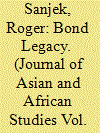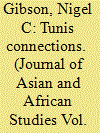|
|
|
Sort Order |
|
|
|
Items / Page
|
|
|
|
|
|
|
| Srl | Item |
| 1 |
ID:
145993


|
|
|
|
|
| Summary/Abstract |
This article surveys the intellectual, fieldwork, and professional career of the anthropologist George Clement Bond. Beginning in 1963, he conducted fieldwork in Zambia over four decades and produced a substantial body of writings on history, ritual, colonialism, and contemporary rural life. He also worked in Uganda in the 1980s on the HIV/AIDS crisis. From 1968, he taught at Columbia University, where he was Director of the Institute of African Studies. Bond’s measured outlook on the interrelated conceptual orientations and practical realities that confront the people anthropologists work among and learn from, and also shape their own circumstances, gave meaning and purpose to his work, which was recognized in honors and awards, speaking invitations, fellowships, and elected professional offices.
|
|
|
|
|
|
|
|
|
|
|
|
|
|
|
|
| 2 |
ID:
146001


|
|
|
|
|
| Summary/Abstract |
Reflecting on Contested Terrains and Constructed Categories: Contemporary Africa in Focus, a book George Bond and I edited during our work at the Institute of African Studies at Columbia University in the late 1990s, this paper considers the notion of contested terrains, that for George Bond was played out in the scholarship of African studies, in the daily encounters which he had with his colleagues, and in his Zambian research. Bond understood these contestations as continuously operating on and across and often taking place below the surface or at the margins of insititutions. This paper emerged in response to Bond’s invitation to speak about Fanon’s psychiatry writings and Fanon’s critique of sociotherapy on a panel he was organizing at the American Anthropological Association in 2014 (AAA). After he died, the focus shifted to include Bond alongside Fanon and Foucault underscoring the continued need for dialog on the work of three intellectuals—African-American, African Caribbean, and French. The connections and misconnections between Fanon and Foucault is in part the discussion about contested terrains and the willfulness of constructed categories. Indeed, intellectual genealogies, the unknown connections as well as dividing lines was something that interested Bond, the anthrolopologist of the politics of knowledge.
|
|
|
|
|
|
|
|
|
|
|
|
|
|
|
|
|
|
|
|
|